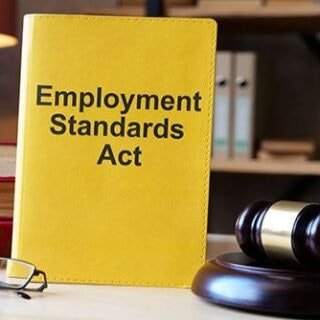Home
Resources
Employment Standards
- Recent Changes to B.C.’s Employment Standards Act
Recent Changes to B.C.’s Employment Standards Act
- Employment Standards

Olivia Cicchini, Employment Relations Expert
(Last updated )


Olivia Cicchini, Employment Relations Expert
(Last updated )
*This blog was updated on February 4, 2022.
British Columbia passed its
noopener
_blank
Employment Standards Amendment Act (Bill 8)
on May 30, 2019. However, not all its provisions came into force at that time.
This blog provides details on
noopener
_blank
the additional amendments
that came into effect on August 15, 2021, and October 15, 2021, respectively.
The amendments in August applied to investigations, complaints, and determinations. Those in October affected the
noopener
_blank
rules and processes
around hiring children.
If you’re a B.C. employer, you may want to take note of these changes to the province’s employment standards. To protect your business and manage your staff fairly, it’s essential that you’re compliant with the
noopener
_blank
Employment Standards Act (ESA)
.
Important changes that came into effect on August 15, 2021, include:
The Director of Employment Standards has the power to investigate compliance with the ESA or stop or postpone the investigation “at any time and for any reason.”
A terminated employee must file a complaint within six months of their last day of employment. An extension may be granted if the Director is convinced that either “special circumstances exist or existed” that delayed the filing of the complaint or that “an injustice would otherwise result” if an extension is not provided.
Another new provision is the Director’s power to use alternative dispute resolution (ADR) process in an investigation.
The Director can now expand an investigation of one worker’s complaint to the broader workplace if needed.
The Director need not provide an oral hearing to those under investigation or affected by the judicial decision. While the Director “must make reasonable efforts” to give people being probed a chance to respond, under the new provisions these efforts do not include an oral hearing.
The Director must draft a written report at the end of an investigation. The report must be served on the complainant, the person against whom the complaint was made, and any person the Director considers should have the opportunity to respond to the report. The Director must consider these responses along with the original written report in making a determination.
Important changes that came into force on October 15, 2021, include:
The general working age for children in British Columbia has been raised to 16 from 12.
Under the new rules, to employ children under the age of 14, employers must get permission from the Director and written consent from the parent or guardian.
If an employer hires a child who is 14 or 15, the employer must get the written consent of the child’s parent or guardian. The child will only be allowed to perform “light work”. Light work means work “unlikely to be harmful to the health or development of a child who is 14 or 15 years of age”.
In some cases, children aged 14 and 15 may be allowed to do work outside the definition of light work with a permit from the Ministry of Labour’s Employment Standards Branch.
The new provisions also define the kind of jobs that are considered “light work” for 14- and 15-year-olds. Examples of these include:
Administrative and secretarial work
Food service work, preparing food, dishwashing, serving food and non-alcoholic drinks, bussing tables
Retail work, such as sales and cashier, stocking shelves, packaging orders, laying out displays
Recreation and sports club work, such as lifeguard, coach, golf caddy, camp counsellor, referee, and umpire
The revised rules also clarify tasks that are not light work.
Under the new provisions, babysitters and home-care workers are exempted from the ESA only if they work, on average, 15 hours or less per week in any four-week period. They shouldn't be live-in home support workers and, if they are babysitters, not reside at the employer’s private residence. The current rules exempt babysitters from the ESA.
The new provisions provide certain exemptions from getting a child employment permit for children doing certain light work if employed by a family farm or a family business, or in a sports or recreational activity for children under 16 years of age, as a camp assistant, assistant coach, referee, or umpire.
Hazardous work for 16 to 18-year-olds
The B.C. government has said it is working to define “hazardous work” for 16 to 18-year-olds. Regulatory changes on the same are expected.
Do you need help staying compliant with the new ESA provisions?
Our experts can help you develop company policies as well as with any other HR, health and safety, or employment advice you need.
As a trusted HR and
noopener
_blank
health & safety
consulting company, Peninsula serves over 4,500 small businesses across Canada. Peninsula’s clients receive ongoing updates of their
noopener
_blank
workplace documentation
and policies as legislation changes. They also benefit from 24/7 employer
noopener
_blank
HR advice
and are supported by legal assistance.
To learn more about how our services can benefit your business, call an expert today at
noopener
_blank
1 (833) 247-3652
.
Related articles
- January 1st 2026Stat Holidays Manitoba 2026: Here’s What Employers Need to KnowStat Holidays & PayLaura ElliotHR Consultancy Services Manager

- January 1st 2026Saskatchewan Stat Holidays 2026: The Complete ListStat Holidays & PayLaura ElliotHR Consultancy Services Manager

- January 1st 20262026 Stat Holidays Newfoundland & Labrador: An Employer’s GuideStat Holidays & PayKiljon ShukullariHR Advisory Manager

Back to resource hub
Try Peninsula Canada today
Find out what 6,500+ businesses across Canada have already discovered. Get round-the-clock HR and health & safety support with Peninsula. Click below to unlock free advice, policies, e-learning, and more.
Speak to an expert